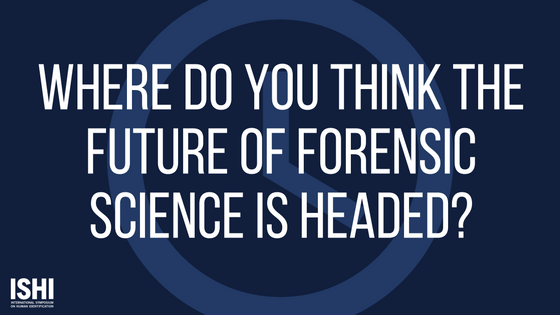MPS? Rapid DNA? Phenotyping? Read below to see what our ISHI 27 speakers predict for the future of forensic science then join the discussion on our Facebook or Twitter pages to let us know what you anticipate for the future of the field.
“I see the future of forensic science headed towards technological advancements to increase even more throughput. I think the technology will become smarter and faster to help decrease the amount of casework backlog.”
Alice Chung, SNA International
 “Technologically the improvements are profound. However law enforcement, bureaucracy, and the legal system continue to be major impediments to widespread use and acceptance of these improvements. Generally speaking, improvements such as familial DNA searching, rapid DNA, MPS and probabilistic genotyping should see more widespread use.”
“Technologically the improvements are profound. However law enforcement, bureaucracy, and the legal system continue to be major impediments to widespread use and acceptance of these improvements. Generally speaking, improvements such as familial DNA searching, rapid DNA, MPS and probabilistic genotyping should see more widespread use.”
Rockne Harmon, Alameda County District Attorney’s Office (retired)
 “I am hopeful that massively parallel sequencing will become commonplace in the forensic DNA laboratory, and that we will continue to challenge the technological and computational capabilities of mixture de-convolution assays, so that one day we will be able to resolve complex DNA mixtures of 3+ individuals. I am also really excited about the idea of rapid DNA analysis for reference samples after initial collection from perpetrators of crimes. I think the police agencies will benefit greatly from being able to perform their own preliminary examinations.”
“I am hopeful that massively parallel sequencing will become commonplace in the forensic DNA laboratory, and that we will continue to challenge the technological and computational capabilities of mixture de-convolution assays, so that one day we will be able to resolve complex DNA mixtures of 3+ individuals. I am also really excited about the idea of rapid DNA analysis for reference samples after initial collection from perpetrators of crimes. I think the police agencies will benefit greatly from being able to perform their own preliminary examinations.”
Nicole Novroski, University of North Texas Health Science Center
“I see forensic science progressing forward rapidly. With the advent of modern technology and the forward thinking to capitalize on the progression of that technology, I see no limits to what forensic science can accomplish.”
Rachel Wiley, University of North Texas Health Science Center
“Sequencing.”
Hristina Lekova, Cuyahoga County Medical Examiner’s Office
“The U.S. forensic science community in this Post-NAS Report environment is likely going to be more scrutinized and regulated. The challenging objective is to make meaningful, effective, scientific improvements to the quality of the forensic science tests and their introduction into the judicial system while setting aside political and personal agendas.”
Julie French, GE Healthcare
“I think we’re heading towards an era of forensic science where DNA will lead to detailed physical descriptions of suspects that can be used as investigative leads. What the implications of that might be, I’m not sure, but I think it’s where we are going.”
Kendra Felipe-Ortega, University of North Texas Health Science Center
“I see the future of forensic science hopefully heading towards proteomics and mass spectrometry.”
Tatiana Perez, NYC Office of Chief Medical Examiner
“With the increase in sensitivity and detection I think there is a big question and has already been research on how much transfer (secondary etc…) could potentially be affecting our results, or more specifically how investigators interpret those results. I think this will be a continued focus on learning what can be said about minimal amounts of DNA and how they came to be where they are.”
Samantha Rynas, New Mexico Department of Public Safety Northern Forensic Laboratory
“I envision a lot more standardization and applications of statistical models to other fields in forensic science comparable to what we see in forensic DNA; however, change doesn’t happen overnight and I think it will be years before we see the completion of things like universal certification requirements, OSAC standards for all fields, etc.”
Rachel Oefelein, DNA Labs International
“I can’t speak to all forensic sciences, but when it comes to DNA, I think we are headed towards universal DNA databases. This may not happen in my lifetime or through law enforcement, but would be invaluable for medical research and human rights identifications, so feels inevitable. If you look at the scope of genomic sequencing in the medical arena, you can appreciate that the technology is broad, cheap, and transportable. As for policy and ethics, a universal database is far less discriminatory than the discreet population and case-by-case approach that has transpired over the past two decades. But we will need more and deeper discussions and protections to assure that universal databases are useful for forensic and medical purposes while protecting against abuse of power.”
Sara Katsanis, Duke University
“An ever-increasing emphasis on automation, standardization, quantitative methods, and statistics in all aspects of forensics.”
Ted Hunt, Prosecuting Attorney’s Office, Jackson County Missouri
“I do not want to even venture a guess. The problems forensic scientists face are complex and require detailed analysis and clever solutions. Solutions that originate from tackling such problems will, I suspect, bring about significant advances.”
Catherine Grgicak, Boston University School of Medicine
“In amazing directions of speed, sensitivity, and precision but, all at a cautious pace.”
Chuck Heurich, National Institute of Justice
WOULD YOU LIKE TO SEE MORE ARTICLES LIKE THIS? SUBSCRIBE TO THE ISHI BLOG BELOW!
SUBSCRIBE NOW!














